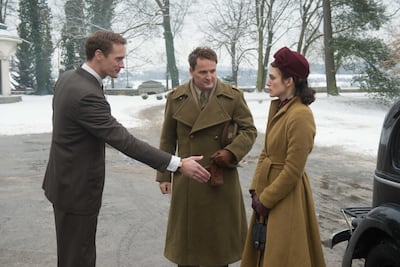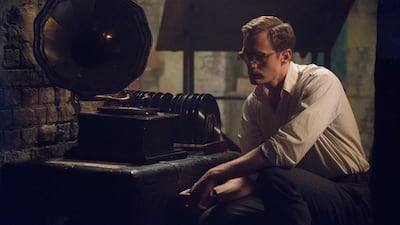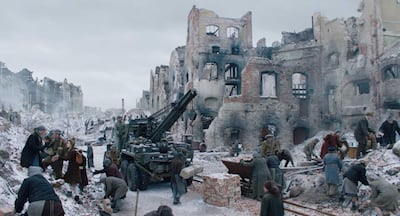As any student of 20th Century history will know, the Second World War has long been recognised as “the good war”, as Allies were pitted against the pernicious forces of Nazi Germany and the other ‘Axis powers’.
Former US President Dwight Eisenhower referred to it as "the Great Crusade" – something Hollywood has rarely argued with across the years in gung-ho films such as The Longest Day and The Dirty Dozen. Of course, reality is never quite so clear-cut.
"The Second World War is a story that's been told so many times in literature and on screen," agrees actor Alexander Skarsgard (Big Little Lies, True Blood).
“Especially in the UK and the US, I find it’s often portrayed in not a very nuanced way. It’s very black-and-white. It’s always the heroic Allies versus the evil Germans, and then they throw in the one token Good German, the one soldier who does something nice just to prove that they’re not all bad. It’s rarely psychologically interesting.”
It's what drew Skarsgard to The Aftermath, the new film from British director James Kent (who previously made the excellent First World War drama, Testament of Youth). Set in 1946, just months after the war ended, The Aftermath takes place in Hamburg. Here, Kent portrays a city on its knees.
“The Allies dropped more bombs on Hamburg over three days than London received in the entire Second World War,” says Kent, who vividly shows the economic, social and psychological toll as the Allied forces roll in.
“It’s an extraordinary moment,” the director adds. “The world’s been absolutely laid flat in a way it never had before.”
In The Aftermath, bitterness, hatred and suspicion of the enemy brews amongst the victors, even as the British refuse to punish the Germans and repeat the mistakes that followed the end of the First World War.
If this is somewhat lost on some of his less enlightened characters, Kent calls it’ “an astonishingly generous, positive, and far-sighted moment in British history”, one that ultimately led to the creation of the European Union.
While this makes The Aftermath a resonant viewing experience – particularly with Britain's current mooted departure from the EU threatening stability – the story itself is a departure from the typical Hollywood wartime movie.
“I thought it was beautiful and interesting to get to know the people on the other side of the trenches,” says Skarsgard, who plays Stephan Lubert, a German architect who lost his wife during the war and now lives with his troubled young daughter, Freda (Flora Li Thiemann).
The majority of the German population “were more like Lubert,” says Skarsgard. “He’s been compromised and there’s a complexity to his personality, so he carries a lot of guilt.
“He didn’t stand up for what he believes in and he did benefit from what they were doing; he wasn’t an active member of the Nazi party but his wife’s family was. The big house they live in and all that Bauhaus furniture was bought with Nazi money. Now he didn’t know about the concentration camps, but he obviously knew about the treatment of Jews.”
The intrigue comes as Lubert and Freda see their house requisitioned by the Allies. A British Colonel, Lewis Morgan (Jason Clarke), stationed to oversee the rebuilding operation, and his wife Rachael (Keira Knightley) move in, sharing the space with Lubert and his daughter.

Like their hosts, the Morgans are suffering; their own young son was killed during the war by a German bomb, which creates enormous tensions. “Lewis is sensitive to the plight of Europe and Germany,” says Clarke, “but not to his wife and what they’ve been through – they’re trying to cope with their own loss.”
Curiously, the film has a basis in reality. Clarke’s character was inspired by author Rhidian Brook’s own grandfather, Colonel Walter Brook, who was an English officer sent to Hamburg in the wake of the Second World War.
Like Morgan, Brook shared his living arrangements with a German family, rather than choose to have them evicted from their own home. Inspired by this, Rhidian Brook pitched the story to director Ridley Scott’s company; out of this grew not only the screenplay but Brook’s 2013 best-selling novel.
Without venturing into spoiler territory, The Aftermath moves into romantic drama terrain as the story unfolds; comparisons have been made to Joe Wright's adaptation of Ian McEwan's novel Atonement, which also starred Knightley. Kent, though, prefers to look further back.
A huge fan of David Lean, he hails "touchstones" such as Doctor Zhivago and Lawrence of Arabia. "What he captures so brilliantly is the coming together of the intimate and the epic … they have scale, but they are also deeply emotional films."
It might be pushing it to compare The Aftermath to the grandiose work of David Lean, but there's something to be said for a film that avoids the morally binary characters so often peddled by Hollywood.
Here, Knightley’s Rachael has a pathological hatred for all things German and Kent’s film does a sterling job of painting a complex and compromised postwar populous; Lubert’s daughter even gets involved with a brainwashed former Hitler Youth adolescent who still wants to fight against the Allies.
More than anything, The Aftermath is a film about grief. "I thought it was interesting to portray a man who is so broken," says Skarsgard. "He lost his wife, he lost his home … there was such a rich, deep complexity to him. He's not a hero but he's also not a villain." Likewise, the Morgans are suffering from post-traumatic stress. "How do they find meaning?" ponders Clarke. "How do they put their lives back together? How do they find a way ahead after they've lost a child? How does a country? How does a world?"
It’s this that interests Kent, and what he argues makes the film feel so pertinent to the present day. In a time when an international refugee crisis has seen Germany throw open its doors to the displaced and the disenfranchised, other countries have proved less welcoming. “We have a responsibility to the future, just as the generation had in 1945,” says Kent. “Their challenge was much larger than ours and they rose to it.”
The Aftermath is in cinemas across the UAE now


